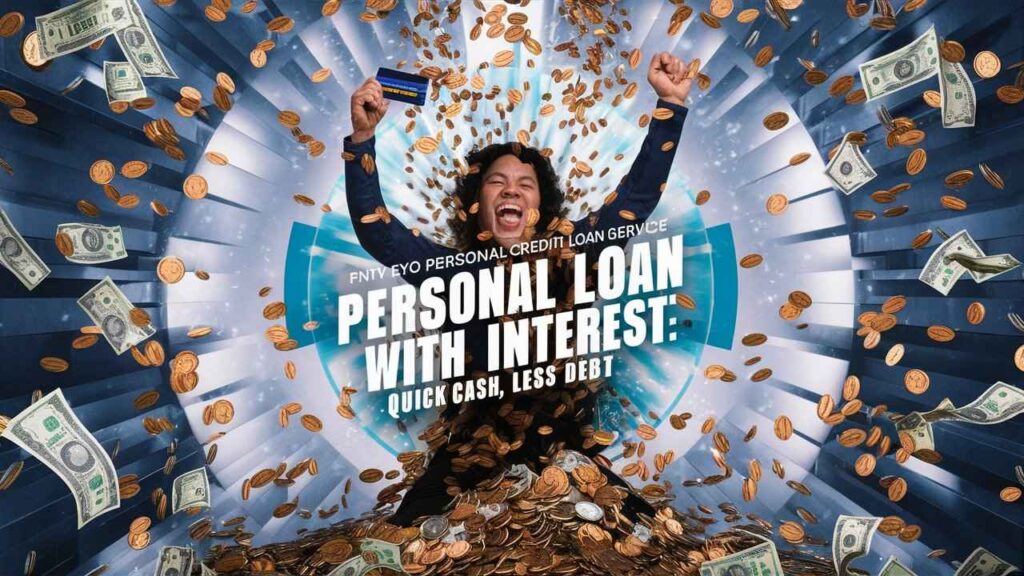The Appeal of Quick Cash: Why We All Need It Sometimes
In a world where financial surprises lurk around every corner, the allure of quick cash is undeniable. Whether it’s an unexpected car repair, a medical emergency, or just that impulse buy that you really, really need (because who doesn’t want a cat-shaped teapot?), having access to funds can be a lifesaver. Enter personal loans💰your trusty sidekick in the journey of financial management. With a personal loan, you can snag that cash in a flash, freeing yourself from the chains of financial stress.

Low-Interest Loans: The Debt-Busting Superpower
Low-interest loans aren’t just a nice idea; they are the superheroes of the borrowing world. Imagine a scenario where you can borrow money without the impending doom of exorbitant repayment costs. Sounds dreamy, right? Low-interest personal loans can save you from spiraling debt and offer you financial flexibility. They can be the difference between living paycheck to paycheck and enjoying a bit of financial breathing room.
What is a Personal Loan?
A personal loan is a versatile financial tool that allows individuals to borrow money for a variety of purposes💰think debt consolidation, home renovations, or even that trip to the Bahamas you’ve been eyeing. Typically, these loans are unsecured, meaning you don’t have to put your prized possessions up as collateral. You receive a lump sum of cash upfront and then repay it over a set period, with interest. It’s straightforward💰what’s not to love?

Secured vs. Unsecured Personal Loans: Which is Right for You?
When it comes to personal loans, you have two main types: secured and unsecured. A secured loan requires collateral💰like your shiny new car or your grandma’s vintage jewelry💰while an unsecured loan doesn’t. If you’re looking for lower interest rates and can afford to risk your assets, a secured loan might be your best bet. However, if you prefer to keep your belongings safe, an unsecured loan is the way to go. It’s all about weighing the risks and benefits.
Why Interest Rates Matter: The Cost of Borrowing Explained
Interest rates can feel like the villain in a superhero story, but they play a crucial role in the borrowing process. A low-interest rate means you’ll pay less over the life of the loan, while a high-interest rate can lead to a debt spiral that leaves you gasping for air. Understanding how these rates are determined can help you make informed borrowing decisions and save your hard-earned cash.
The Benefits of Low-Interest Personal Loans
How Low Interest Reduces Your Debt Burden
The magic of low-interest loans lies in their ability to ease your financial burdens. Lower interest means smaller monthly payments and, ultimately, less money spent over time. This allows you to tackle your financial goals more effectively💰whether that’s paying off debt faster or saving for a rainy day. With less of your income allocated to interest, you can breathe a sigh of relief and start building your financial future.

Low Interest Equals Lower Stress: Managing Repayments
When repayments are manageable, life just feels easier. Low-interest personal loans allow you to create a repayment plan that aligns with your budget. Less stress equals a happier you💰whether you’re treating yourself to a spa day or simply enjoying a quiet evening at home without the weight of financial worries.
Why Quick Cash Doesn’t Have to Mean High Interest
Many people fear that quick cash comes with a hefty price tag in the form of high-interest rates. However, that’s not always the case. By doing your homework and shopping around, you can find personal loans that offer both speed and low interest, allowing you to tackle your financial needs without breaking the bank.
Finding a Personal Loan with Low Interest
Shopping Around: Comparing Lenders for the Best Deal
Don’t settle for the first offer you receive; shopping around is key to finding the best deal. Lenders vary in terms of interest rates, fees, and terms. Take the time to compare multiple lenders, and you might just stumble upon a diamond in the rough that offers you the perfect loan for your needs.

Fixed vs. Variable Interest Rates: Which is More Advantageous?
Fixed interest rates provide certainty💰your payment won’t change throughout the life of the loan. On the other hand, variable interest rates can fluctuate based on market conditions. While variable rates may start lower, they can also lead to higher payments down the line. Understanding your risk tolerance and financial goals will help you decide which type of rate is best for your situation.
Understanding APR vs. Interest Rate: Don’t Get Fooled
APR (Annual Percentage Rate) is not just a fancy term; it’s a critical number that combines the interest rate with any additional fees you might incur. When comparing loans, look at the APR to get a clearer picture of the total cost of borrowing. This knowledge can save you from surprises that would otherwise pop up like unwelcome party crashers.

Eligibility Requirements
What Do You Need to Qualify for a Low-Interest Loan?
Before you embark on your loan journey, it’s essential to understand what lenders look for. Typical requirements include a good credit score, stable income, and a low debt-to-income ratio. Being prepared with the necessary documentation can significantly enhance your chances of securing that coveted low-interest loan.
How Your Credit Score Impacts Your Loan’s Interest Rate
Your credit score is like a financial report card💰it shows lenders how responsible you are with money. A higher score can qualify you for lower interest rates, while a lower score might leave you with higher costs. Keeping your credit score healthy is crucial if you want to score the best deal.
Income Requirements: How Much Do You Need to Earn?
Lenders want to know you have the means to repay your loan. While income requirements can vary, generally, a steady job and a reliable income stream are essential. Be prepared to show proof of income, whether through pay stubs, tax returns, or bank statements.

How to Get the Best Interest Rate
Steps to Improve Your Credit Score Before Applying
If your credit score isn’t quite where you want it to be, don’t fret. There are steps you can take to improve it before applying for a loan. Pay down existing debts, ensure all your bills are paid on time, and limit new credit inquiries. A little time and effort can significantly boost your chances of landing that low-interest rate.
Negotiating with Lenders: Getting a Better Deal
Don’t be afraid to negotiate! Just like you would haggle at a flea market, negotiating with lenders can yield great results. If you have a solid credit history or are a loyal customer, leverage those points to ask for better terms. You might be pleasantly surprised at what lenders are willing to offer.
Timing Matters: When to Apply for a Loan for the Best Rates
Believe it or not, timing your loan application can make a difference. Economic conditions and interest rates fluctuate, so keeping an eye on market trends can help you snag a loan with a lower interest rate. If rates are on the rise, it might be worth applying sooner rather than later.
The Application Process
What Documentation You’ll Need for a Personal Loan
Get ready to gather some paperwork! Typically, lenders require identification, proof of income, and financial statements. Having all necessary documentation organized will expedite the application process and improve your chances of approval.
Online vs. In-Person Applications: Pros and Cons
The digital age has transformed the loan application process, allowing you to apply online from the comfort of your couch. While online applications are typically faster, in-person applications can offer a more personalized experience. Consider your comfort level and choose the method that suits you best.
How Long Does it Take to Get Approved for a Personal Loan?
Patience is a virtue, especially when waiting for loan approval. While some lenders can provide an answer in minutes, others may take days or weeks. Factors such as the lender’s policies and the complexity of your financial situation can affect the timeline.💰
Hidden Fees and Charges: What to Watch Out For
Always read the fine print! Many loans come with hidden fees that can inflate the cost. Origination fees, late payment penalties, and prepayment penalties can catch you off guard if you’re not vigilant.💰
Borrowing Too Much: How to Avoid Overstretching Yourself
It can be tempting to borrow more than you need, especially with quick cash at your fingertips. However, overborrowing can lead to unnecessary stress and a larger debt burden. Assess your needs carefully and borrow only what you can comfortably repay.
Ignoring the Fine Print: The Risks of Skimming the Details
In a rush to secure your loan, don’t gloss over the fine print. Important details about fees, interest rates, and repayment terms often lie within those paragraphs. Take the time to read and understand the terms, as doing so can save you from future headaches.💰
Creating a Repayment Plan That Works for You
Once you have your loan, creating a repayment plan is crucial. Consider your monthly income and expenses, then devise a strategy to pay off your loan without causing financial strain. A well-structured plan keeps you on track and helps you avoid missed payments.
Automatic Payments: A Simple Way to Avoid Missed Payments
Automatic payments can be a lifesaver in ensuring you never miss a due date. Setting up autopay from your bank account can take the stress out of remembering payment dates, allowing you to focus on other things💰like that cat-shaped teapot you’ve been eyeing.
What Happens if You Can’t Pay? Dealing with Financial Hardship
If you find yourself in a situation where paying your loan becomes a struggle, don’t panic. Many lenders offer hardship programs or may be willing to work with you to find a solution. Communicating early and honestly with your lender can open the door to options that could ease your burden.💰
How to Use a Personal Loan to Pay Off High-Interest Debt
Using a personal loan to pay off high-interest debt can be a savvy financial move. By consolidating your debts into one low-interest loan, you can reduce your overall monthly payments and save on interest costs. It’s like giving your finances a much-needed spa day!
Debt Consolidation: When is It a Good Idea?
While debt consolidation can be beneficial, it’s not a one-size-fits-all solution. Assess your financial situation to determine if it’s the right move. If your current debts carry high interest rates and you can secure a lower rate with a personal loan, it might be worth considering.💰
Avoiding the Debt Trap: How to Stay Debt-Free After Consolidating
Consolidating your debt doesn’t mean the battle is over. To truly enjoy the benefits, you must adopt responsible spending habits. Avoid accruing new debt, create a budget, and stick to it💰this will ensure you remain on the path to financial freedom.
Investment Opportunities
Can You Use a Personal Loan for Investments?
Using a personal loan for investments can be a double-edged sword. While it may provide you with the necessary funds to invest in opportunities, remember that it also comes with risks. Make informed decisions and consider the potential returns versus the costs of borrowing.
Low Interest Loans for Home Improvements: Adding Value to Your Property
Home improvements can be a worthwhile investment, and a low-interest personal loan can fund those renovations. Whether it’s a kitchen remodel or adding a deck, upgrades can enhance your property value and improve your quality of life. Just make sure to choose improvements that will offer a good return on investment.💰
Starting a Business: Using a Low-Interest Loan to Fund Your Dream
If you’ve always dreamed of starting your own business, a low-interest personal loan can provide the necessary seed capital. Just like a trusty pair of boots, it can give you the support you need to get off the ground. Ensure you have a solid business plan to maximize your chances of success.
The Fine Print: Fees and Charges
Origination Fees: What Are They and Why Do You Have to Pay Them?
Origination fees can feel like an unwelcome surprise when applying for a loan. These are fees charged by lenders for processing the loan and can typically range from 1% to 6% of the loan amount. While they may seem minor, they can add up quickly, so factor them into your overall cost analysis.
Prepayment Penalties: Can You Pay Off Your Loan Early Without Extra Fees?
Paying off a loan early may sound appealing, but be cautious💰some loans come with prepayment penalties. These fees can negate the benefits of paying off your loan sooner. Always check for these penalties before signing on the dotted line.
Late Fees: How to Avoid Them and What They Cost
Late fees can add up quickly, so it’s crucial to pay your bills on time. Typically, lenders will charge a flat fee or a percentage of your missed payment. Setting up automatic payments or reminders can help you dodge these pesky fees.
Alternatives to Personal Loans
Balance Transfer Credit Cards: Are They a Better Deal?
Balance transfer credit cards can provide an enticing alternative to personal loans, especially if they offer a promotional 0% interest rate. However, be cautious💰if you can’t pay off the balance within the promotional period, you could end up with a hefty interest bill.
Home Equity Loans: Lower Interest, but Higher Risk
Home equity loans typically offer lower interest rates since they’re secured by your property. However, this means your home is at stake. Weigh the risks carefully before opting for this route, as failing to repay can result in losing your home.
Peer-to-Peer Lending: Is It Worth the Hype?
Peer-to-peer lending platforms have gained popularity as alternatives to traditional loans. They often offer competitive rates, but be sure to read reviews and research the platform. Not all peer-to-peer loans are created equal, so do your due diligence.
The Impact of a Low-Interest Loan on Your Credit
How Taking Out a Loan Affects Your Credit Score
A low-interest loan can have a mixed impact on your credit score. Initially, applying for a loan may cause a small dip due to the hard inquiry. However, if you make timely payments, you can positively affect your credit score in the long run.💰
Responsible Borrowing: Using a Loan to Improve Your Credit
Using a personal loan responsibly can bolster your credit score. Making consistent, on-time payments demonstrates to lenders that you are a reliable borrower, which can open doors for future credit opportunities.
What Happens to Your Credit If You Miss Payments?
Missing payments can have a devastating impact on your credit score. Not only can late payments lead to fees, but they can also remain on your credit report for up to seven years. If you find yourself in financial trouble, reach out to your lender before your payment is due to explore your options.💰
Real-Life Case Studies
Success Stories: How People Used Low-Interest Loans to Achieve Their Goals
Across the nation, people are utilizing low-interest loans to achieve their financial aspirations. From funding education to starting a new business, these success stories show that with the right tools, financial dreams can become a reality.
Debt Relief: Real People, Real Results
Consider Jane, who consolidated her high-interest debt with a low-interest personal loan. By managing her repayments effectively, she not only eliminated her debt but also improved her credit score. Her story serves as a reminder that with perseverance, financial relief is achievable.
What Can Go Wrong: Lessons from Those Who Mismanaged Their Loans
On the flip side, there are cautionary tales to heed. Mark took out a personal loan without fully understanding the terms and ended up drowning in debt. His experience underscores the importance of research and understanding what you’re signing up for.
Frequently Asked Questions
Can I Get a Low-Interest Loan with Bad Credit?
While it may be challenging, it’s not impossible to secure a low-interest loan with bad credit. Some lenders specialize in providing loans to individuals with less-than-perfect credit, but be prepared for higher rates.
How Fast Can I Get Approved for a Low-Interest Loan?
Approval times can vary widely based on the lender and the complexity of your financial situation. Some lenders may offer instant approval, while others could take days. Patience is key!
What Are the Risks of Low-Interest Loans?
While low-interest loans are generally advantageous, there are risks. Mismanaging repayments, hidden fees, and the temptation to overborrow can lead to pitfalls. Always approach borrowing with caution and diligence.
Conclusion
The Bottom Line: Quick Cash with Less Debt is Possible
In conclusion, securing a personal loan with low interest can be a game changer. It provides a feasible way to access quick cash without the burden of exorbitant debt. By understanding the ins and outs of borrowing, you can make informed decisions that align with your financial goals.
Your Next Steps: How to Find and Secure a Low-Interest Loan
Now that you’re armed with knowledge, it’s time to take action! Begin by assessing your financial situation, researching lenders, and comparing offers. With diligence and patience, you can find a low-interest loan that meets your needs.
Call to Action
Ready to Take Control of Your Finances? Apply for a Low-Interest Loan Today
Why wait? Take control of your financial future and explore your options for low-interest loans. The path to financial freedom is just a few steps away.💰
More Resources: Where to Find Lenders and Financial Advice
For further guidance, check out online resources, financial calculators, and articles that delve deeper into personal finance. The more informed you are, the better choices you can make.
People Also Ask
Which bank is the lowest interest for a personal loan?
Finding the bank with the lowest interest for a personal loan can vary depending on your credit profile and the specific loan terms. However, as of recent data, online banks and credit unions often offer some of the most competitive rates. It’s advisable to compare rates from multiple lenders, including SoFi, LightStream, and Marcus by Goldman Sachs, to find the best option for your circumstances.
What loan has the lowest interest rate?
Generally, secured loans tend to have the lowest interest rates, as they are backed by collateral. Among personal loans, home equity loans or HELOCs (Home Equity Lines of Credit) often feature lower interest rates compared to unsecured loans. Always shop around for the best rates from various lenders.
Is 7% a good rate for a personal loan?
Yes, a 7% interest rate for a personal loan is considered good, especially for borrowers with good credit. The average personal loan interest rates typically range from 10% to 36%, depending on creditworthiness, so a 7% rate can significantly reduce borrowing costs.
How much would a $5000 personal loan cost a month?
The monthly payment on a $5,000 personal loan will depend on the interest rate and loan term. For example:
- At 7% for 3 years (36 months): Approximately $154 per month.
- At 10% for 3 years (36 months): Approximately $161 per month.
- At 12% for 3 years (36 months): Approximately $166 per month.
Use a personal loan calculator to get specific estimates based on your loan terms.
Do banks offer 0% loans?
Banks may offer promotional 0% interest loans, but these are usually limited to specific situations, such as balance transfer credit cards or promotional financing on large purchases (e.g., furniture or appliances) with specific retailers. It’s essential to read the fine print to understand the terms.
Can I get a 0% bank loan?
While rare, you may be able to secure a 0% bank loan through specific promotional offers or credit cards that provide an introductory 0% APR for a limited time. However, these offers often come with high fees or conditions that can offset the benefits.
Can you get interest-free loans?
Interest-free loans do exist, often provided by certain nonprofit organizations, government programs, or as part of promotional financing from retailers. Be sure to check eligibility criteria and repayment terms.
Which loan is cheaper?
Typically, secured loans (like home equity loans) are cheaper than unsecured personal loans due to lower interest rates. However, the cost will also depend on fees, repayment terms, and the borrower’s creditworthiness.
Which loan has zero interest rate?
0% interest loans are most commonly found in promotional financing from retailers or specific government-backed programs. Check with local credit unions or nonprofit organizations for potential options.
What is the best low interest personal loan?
The best low-interest personal loan will vary based on your financial situation and credit profile. However, some reputable lenders known for competitive rates include SoFi, Marcus by Goldman Sachs, and LightStream. Always compare multiple options.
Which type of loan has no interest?
Certain loans, such as some peer-to-peer loans or specific community-based loans, may offer no interest, but they are rare. These usually come with specific eligibility requirements and conditions.
Which bank is best for a personal loan?
The best bank for a personal loan depends on your individual needs, but popular options for competitive rates include Discover, Marcus by Goldman Sachs, and PenFed Credit Union. Evaluate each based on interest rates, fees, and customer service.
Which bank is very low interest rate?
Banks like SoFi, LightStream, and Marcus by Goldman Sachs often provide very low-interest rates for qualified borrowers. Always compare current rates and terms to find the best option for you.
Where can I get a loan with low interest?
You can find low-interest loans from a variety of sources, including credit unions, online lenders, and traditional banks. Make sure to shop around and compare rates from multiple lenders to secure the best deal.
Is 12% high on a personal loan?
A 12% interest rate on a personal loan is considered on the higher end but may be reasonable for borrowers with fair to good credit. Rates can vary significantly based on creditworthiness, so it’s important to shop around.
What is a normal loan rate?
As of recent trends, a normal personal loan rate typically ranges from 10% to 36%, depending on factors like credit score, loan amount, and loan term.
Is 10% good for a personal loan?
Yes, a 10% interest rate for a personal loan is generally considered good, especially for borrowers with average credit. It’s lower than the average rate for personal loans, which often exceeds 10%. Always strive to secure the lowest possible rate by comparing offers.









